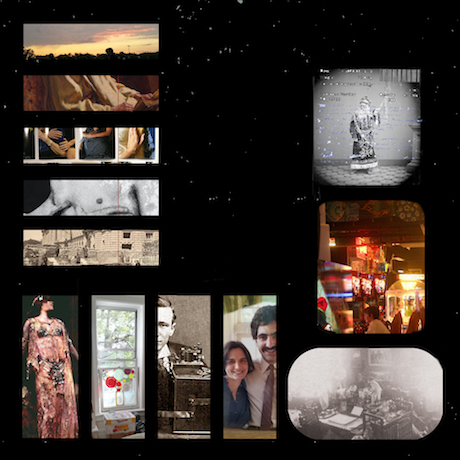To the Planetarium
(May 2020)
To the Planetarium was commissioned by Issue Project Room as a part of their Isolated Field Recording series during the early part of the coronavirus lockdown. The series was very sensitively organized by Nick Scavo at IPR. It premiered via "livestream" on May 13, 2020. Here are the sort of 'program notes' I supplied for the event:
When I was a kid, there was this big dictionary in our house that had print so small that it came with this little domed magnifying glass, which I am looking up now and seeing that it is called a 'loupe.' This loupe was smooth on the bottom and could glide across the page, with a black band around the base and then this perfect dome of glass magnifying the words directly under it.
On May 10, 1849, the Astor Place Riot broke out in New York City over a bitter rivalry between an American and a British Shakespearean actor. It seems like this feud was really a cultural proxy for a deeper class conflict in New York at the time––the elites being typically Anglophilic and the working class supporting the American actor. The 'riot' only became a riot when the mayor and the police chief called in the Rmilitia and re-armed the cops, as always. The story is that the masses congealed around the rallying cry of 'to the opera house!,' meaning the Astor Place Opera House, where William Charles Macready (the British actor) was playing Macbeth that night. The Astor Place Opera House had to close permanently after the riots and was torn down in 1890 to make room for an 11-story building that is now a bunch of condos, and I think a CVS.
A planetarium, or at least a sort of stock image of one I have in mind, is shaped just like a loupe, with a flat bottom, a thick base, and a domed top. But its lens magnifies in the other direction––we stand inside of it and supposedly see the stars magnified for us. We think we’re seeing the stars up close, but maybe the stars are seeing us, reading us like little syllables strung together to make definitions.
I don’t know much about this, but I think that certain trends in Jewish mysticism propose an Adamic language that Adam and Eve used to name everything they saw and felt, and that these words are the sort of divine, primordial names for things. This would obviously be before the 'confusion of tongues' and the tower of Babel. This “Adamic language” is kind of a troubling thought to me, but I’m not sure why. The source of my unease may be related to something that Kafka supposedly said, that the alternative to Zionism is Kabbalah. This idea makes a lot of sense to me, though I don’t know if he ever said it.
To the Planetarium is a long piece, but I hope not to suggest any kind of heroic marathon listening. It’s designed to be and stay kind of open because I’d like to keep working on it after this livestream. So I can recommend that you listen to it as much or as little as you want, tune in and out, have dinner, go to sleep (goodnight!), return to it later if you want. How far off of the surface of the earth do you have to be to see the curve of the earth? That’s where I’d like this music to be played––not in volume, god no, but in altitude.
Back to music